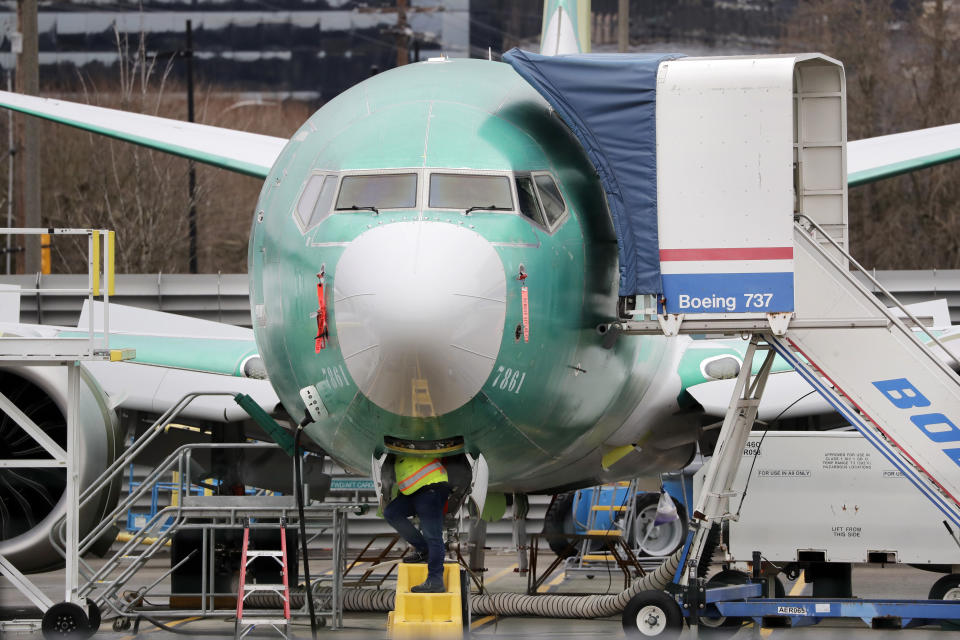Boeing posts shock loss as 737 MAX crisis grows, but stock rises
Boeing on Wednesday reported a surprise loss in the fourth quarter, as the company struggled to contain the fallout from the grounding of its flagship 737 MAX plane, which shows no signs of taking to the skies again anytime soon.
The grounded 737 MAX plane — which has idled on runways for nearly a year in the wake of two fatal crashes — bled over $1 billion from the company’s bottom line in the final months of 2019, and gave Boeing its first annual loss in over 20 years. The controversy forced Boeing to oust Dennis Muilenburg as its CEO last month, and the company still has no concrete timetable for when the plane can fly again.
However, investors appeared to breathe a sigh of relief that the financial damage wasn’t worse — and bet that Boeing was on a path to resolving the biggest crisis the company has ever faced. The stock — one of 30 components of the Dow Jones Industrial Average (DJI) — popped by nearly 2%, ending the day at $321.94.
Here’s what Wall Street expected on key metrics, according to Bloomberg:
Revenue: $17.9 billion vs. $21.73 billion expected
Adjusted loss earnings per share: $2.33 vs $1.30 profit expected
GAAP loss per share: $1.79
During the quarter, Boeing hemorrhaged operating cash flow, to the tune of a $2.2 billion loss, which reflected the impact of the plane’s idling. Yet it still paid out $1.2 billion of dividends — something the company has pledged to do despite the uncertainty.
"We recognize we have a lot of work to do," David Calhoun, Boeing’s newly-installed president and CEO, said in a statement.
Pledging to be more transparent in the wake of reports that Boeing was aware of the plane’s issues prior to the fatal crashes, he said the company was fully committed to restoring the 737 MAX to service.
“Safety will underwrite every decision, every action and every step we take as we move forward,” Calhoun added. “Fortunately, the strength of our overall Boeing portfolio of businesses provides the financial liquidity to follow a thorough and disciplined recovery process.”
Amid the debacle, the aerospace giant has had to tap banks for more than $12 billion in loans to bolster its finances, as economists estimate the impact will ripple across the U.S. economy, as well as other industries.

Boeing’s operating margin from commercial airplanes plunged by over 38% in Q4 as costs surged, a reflection of fewer 737 deliveries, and a pre-tax charge of $2.6 billion related to the MAX grounding. Year over year, deliveries plummeted by 67%, and revenues dived by 55%.
“In addition, the suspension of 737 MAX production and a gradual resumption of production at low production rates will result in approximately $4 billion of abnormal production costs that will be expensed as incurred, primarily in 2020,” the company said.
The company’s fortunes are tied closely to those of the broader market, and the U.S. economy, which is facing a period of uncertainty as global growth slows and the coronavirus outbreak hits travel and leisure. Economists estimate the 737 MAX troubles will be a drag on gross domestic product (GDP) in the first quarter of 2020 — perhaps by as much as a half percentage point.
“With deliveries of the grounded jet long since halted, investment and exports in aircraft are unlikely to fall much further from here,” Capital Economics wrote in a research note to clients last week.
“But Boeing’s recent decision to halt production of its biggest-selling plane will still result in a sharp fall in manufacturing output which could weigh on first-quarter GDP,” the firm added.
Given the rally in Boeing’s shares on Wednesday, investors seem to be reassured that Calhoun can deliver a timetable for returning the 737 MAX to service, despite new concerns about the warning signs the company received ahead of the two crashes.
“To survive, Boeing needs to rip open the cockpit and get transparent with itself and the public,” said Eric Schiffer, CEO of Reputation Management Consultants.
“Boeing will face massive financial turbulence over the next year,” he added. “It will take two years to get on the right financial flight path and gain back full investor and public confidence as a brand that can safely reinvent aerospace - not damage it.”
With the crisis on full tilt, Wall Street analysts have been lowering their expectations for the aerospace giant’s stock. Credit Suisse lowered its price target on the stock to $321 and rates it “Neutral.”
The firm sees a very low probability — less than 5% — that the idled plane won’t return to service at all. Credit Suisse said the 737 MAX’s return is a “far more likely scenario” that will affect what Boeing will do about the plane’s successor.
Javier David is an editor for Yahoo Finance. Follow Javier on Twitter: @TeflonGeek
Read more:
How Trump came up with that '303,000' October jobs figure that baffled analysts
Trump reelection odds ‘better than even,’ may top 2016 despite impeachment
Goldman Sachs: Trump has 'narrow' shot in 'close call' election bid
Larry Page steps down; Sundar Pichai to lead both Alphabet, Google
Read the latest financial and business news from Yahoo Finance
Follow Yahoo Finance on Twitter, Facebook, Instagram, Flipboard, SmartNews, LinkedIn, YouTube, and reddit.

 Yahoo Finance
Yahoo Finance 
